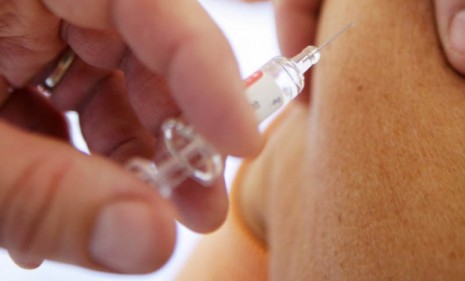The universal flu vaccine: An instant guide
Could this medical breakthrough help put an end to yearly flu epidemics — and annual flu shots?

A free daily email with the biggest news stories of the day – and the best features from TheWeek.com
You are now subscribed
Your newsletter sign-up was successful
The flu vaccine, an annual ritual for many people, could soon become a thing of the past. A team of researchers from Switzerland and the U.K. have identified an antibody called FI6 that's so versatile it can fend off attacks from a wide array of influenza viruses. This breakthrough could someday help to prevent the deadly flu epidemics that sweep across the world each year, killing up to 50,000 people in the United States alone. Three key questions:
Why don't current flu vaccines work better?
Because they fight only one strain of the flu virus. The virus mutates and changes its protein structure rapidly, so each flu season there are several new strains of the virus. As a result, every year medical researchers try to predict which strain of the flu virus will most likely spread throughout the world — and though researchers have a good track record, they don't always succeed. "We need new vaccines and we can't make them fast enough," says Adrian Hill, as quoted by Medical News Today.
The Week
Escape your echo chamber. Get the facts behind the news, plus analysis from multiple perspectives.

Sign up for The Week's Free Newsletters
From our morning news briefing to a weekly Good News Newsletter, get the best of The Week delivered directly to your inbox.
From our morning news briefing to a weekly Good News Newsletter, get the best of The Week delivered directly to your inbox.
What makes this new antibody better?
It's a "universal" antibody, meaning that it can simultaneously fight many different strains of the flu virus. Researchers found there are two proteins inside the virus that are consistent over time and across different strains. By targeting those two proteins, the new FI6 antibody can kill a vast array of flu viruses, and one flu shot could ideally last for many years. "As the first and only antibody which targets all known subtypes of the influenza A virus," says Antonio Lanzavecchia, as quoted by Reuters, "FI6 represents an important new treatment option."
When will a new vaccine become available?
It will likely take several years. Though scientists have isolated the antibody, they still need to develop a vaccine that will enable the human immune system to create these antibodies on its own. "I think five years is a bit ambitious, given where we are now," says Dr. Arnold Monto, as quoted in USA Today. Nonetheless, the eventual creation of a universal flu vaccine is "not a question of whether, but when."
A free daily email with the biggest news stories of the day – and the best features from TheWeek.com
Sources: BBC News, Medical News Today, Reuters, USA Today
-
 How the FCC’s ‘equal time’ rule works
How the FCC’s ‘equal time’ rule worksIn the Spotlight The law is at the heart of the Colbert-CBS conflict
-
 What is the endgame in the DHS shutdown?
What is the endgame in the DHS shutdown?Today’s Big Question Democrats want to rein in ICE’s immigration crackdown
-
 ‘Poor time management isn’t just an inconvenience’
‘Poor time management isn’t just an inconvenience’Instant Opinion Opinion, comment and editorials of the day